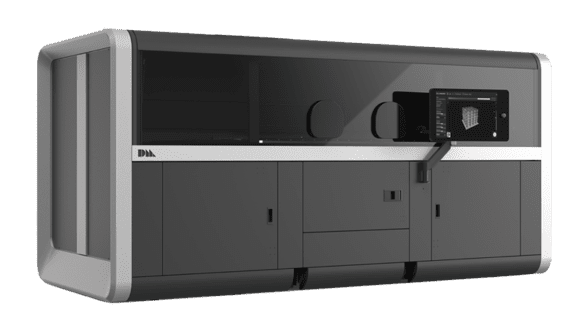Desktop Metal Qualifies 4140 Low-Alloy Steel for High-Volume Additive Manufacturing of End-Use Parts
The company qualified the steel via metal binder jetting for mass production of strong steel parts that withstand high impacts, temperatures, and mechanical stresses.
Posted: June 16, 2021
Desktop Metal Inc. (Burlington, MA) has qualified the use of 4140 low-alloy steel for the company’s Production System™ platform, which uses patent-pending Single Pass Jetting™ (SPJ) technology designed to achieve the fastest build speeds in the metal additive manufacturing industry.
4140 is considered a versatile low-alloy steel that’s characterized by its toughness, its high tensile strength, and its abrasion and impact resistance. It is an all-purpose, heat-treatable steel used extensively in various automotive, oil and gas, and industrial applications, such as gears, downhole tool components, couplings, spindles, bolts and nuts, and many other mechanical parts.
“4140 has been a challenging material for metal binder jetting because of its low alloyed content, tight carbon control requirements, and low ignition energy, which together require advanced binder chemistry, as well as extensive printing and sintering optimization and atmospheric controls for safe processing,” says Jonah Myerberg, co-founder and CTO of Desktop Metal.
“With the speed of the Production System,” Myerberg adds, “businesses can now use binder jetting to print complex 4140 parts at competitive costs while maintaining the strength and mechanical properties of traditionally manufactured alternatives. This is a game-changing solution for manufacturers who have been tied to time-consuming and expensive machining and conventional tool-based manufacturing processes.”
The Production System platform is designed to achieve speeds up to 100 times those of legacy powder bed fusion additive manufacturing technologies and to enable production quantities of up to millions of parts per year at costs competitive with conventional mass production techniques.
The platform consists of two printer models: the P-1, a solution for process development and serial production applications, and the P-50, a large form factor mass production solution for end-use parts, scheduled to begin commercial shipments in the second half of 2021.
The platform is designed to allow customers to produce high-performance parts using the same low-cost metal powders used in the metal injection molding (MIM) industry.
Desktop Metal’s materials science team validated that 4140 printed on Production System technology and sintered by Desktop Metal meets MPIF 35 standards for structural powder metallurgy parts set by the Metal Powder Industries Federation.
Other materials compatible with the platform include reactive metals, such as aluminum and titanium. Besides 4140, the platform’s materials library also includes 17-4 PH stainless steel and 316L stainless steel, both of which have been qualified by Desktop Metal. The company plans to add other metals to its portfolio, including tool steels, stainless steels, superalloys, copper, and more.
Several applications of 4140 low-alloy steel are herringbone gears, linear pneumatic pistons, and power steering joints.
According to Desktop Metal, 4140 parts printed on the Production System platform not only eliminate the use of tooling and minimize material waste, but also represent a significant decrease in production time and part cost compared to conventional manufacturing methods.
In the case of power steering joints, for example, Desktop Metal says that the joints’ production via a conventional press and sinter process would require an expensive mold, but the Production System P-50 can produce the joints with no tooling, reducing lead times and enabling more flexible design for quantities up to 1.2 million per year at a fully burdened part cost as low as $2.45.















